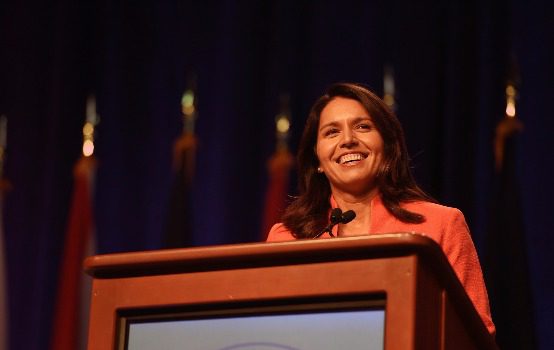Are the 2020 Democratic Candidates Ignoring Foreign Policy?

There is a congealing conventional wisdom that the 2020 Democratic presidential candidates don’t have much to say about foreign policy. E.J. Dionne began a recent column asking this question:
Why aren’t Democratic presidential candidates talking more about foreign policy?
Dionne uses the question to talk about public opinion on foreign policy, but his question raises the obvious retort: more than what? Several of the 2020 Democratic candidates have been saying plenty about the U.S. role in the world, our ongoing wars overseas, and important diplomatic agreements, but for some reason that doesn’t seem to be enough.
Ira Stoll makes an even stronger assertion:
You’d think that with more than 20 Democrats running for President, at least one of them would try to differentiate herself, or himself, from the rest of the field by focusing on the president’s role in diplomacy and national security.
It’s still early in the campaign. But none of the major Democratic candidates has made foreign policy a focus.
This claim about the neglect of foreign policy wasn’t true when Tom Friedman said it a few months ago, and it definitely isn’t true now. There are admittedly so many Democratic candidates running right now that you can find quite a few that have said little or nothing of substance about foreign policy, but it isn’t true that none of them has focused on foreign policy as an important difference with the incumbent. Bernie Sanders is probably the most vocal and most consistent in speaking out against Trump administration foreign policy errors from Yemen to Venezuela, and he has distinguished himself by doing something about U.S. involvement in the war on Yemen, but he is hardly the only one. Elizabeth Warren has made a point of articulating her foreign policy vision very clearly and early on, and Rep. Tulsi Gabbard is pounding away on these issues almost every day if anyone would pay any attention to what she is saying. Virtually every declared Democratic candidate has endorsed reentering the JCPOA in a reversal of Trump’s decision to renege on it. Even the famously detail-averse Pete Buttigieg ruled out military intervention in Venezuela just the other day. The candidates’ interest in recruiting foreign policy advisers would not be as intense as it is if they didn’t intend to talk about these issues later on. At such an early stage in the campaign, have presidential candidates in previous elections spent more time on foreign policy than this field has so far? Perhaps, but it hasn’t happened in the last decade.
The 2020 Democratic candidates may not be talking about foreign policy as much as I would like, but I am not their target audience. Considering how little interest most voters have in foreign policy issues, it is significant that there has been as much discussion of these issues as there has been by this point in the cycle. At the same point in the 2016 cycle, there was essentially no discussion of foreign policy on the Democratic side and not much more in the other party. The biggest change between then and now has been in the Sanders campaign. Sanders had relatively little to say about these issues four years ago, and today he is one of the leading critics and opponents of Trump’s foreign policy from the left. It is telling that this never comes up in any of the columns that claim that the 2020 candidates aren’t talking about the things that Sanders is talking about all the time.
When pundits complain that presidential candidates aren’t talking about foreign policy, it may be that the candidates are ducking the issues, or it may be that the pundits are ignoring what the candidates have been doing and saying. In this case, I think it’s clearly the latter.
Comments